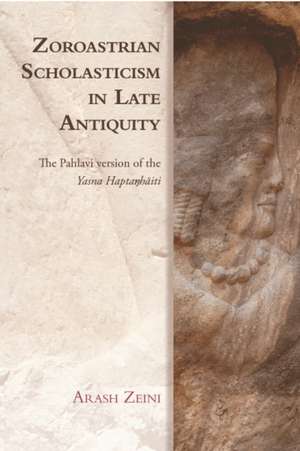Zoroastrian Scholasticism in Late Antiquity: Edinburgh Studies in Ancient Persia
Autor Arash Zeinien Limba Engleză Paperback – 30 mai 2022
| Toate formatele și edițiile | Preț | Express |
|---|---|---|
| Paperback (1) | 216.34 lei 3-5 săpt. | |
| EDINBURGH UNIVERSITY PRESS – 30 mai 2022 | 216.34 lei 3-5 săpt. | |
| Hardback (1) | 677.38 lei 3-5 săpt. | |
| EDINBURGH UNIVERSITY PRESS – 3 feb 2020 | 677.38 lei 3-5 săpt. |
Preț: 216.34 lei
Preț vechi: 236.46 lei
-9% Nou
41.40€ • 43.06$ • 34.18£
Carte disponibilă
Livrare economică 24 martie-07 aprilie
Specificații
ISBN-10: 1474442897
Pagini: 432
Dimensiuni: 156 x 234 x 22 mm
Greutate: 0.6 kg
Editura: EDINBURGH UNIVERSITY PRESS
Seria Edinburgh Studies in Ancient Persia
Descriere
In late antiquity, Zoroastrian exegetes set out to translate their ancient canonical texts into Middle Persian, the vernacular of their time. Although undated, these translations, commonly known as the Zand, are often associated with the Sasanian era (224-651 ce). Despite the many challenges the Zand offers to us today, it is indispensable for investigations of late antique exegesis of the Avesta, a collection of religious and ritual texts commonly regarded as the Zoroastrians' scripture.
Arash Zeini also offers a fresh edition of the Middle Persian version of the Avestan Yasna Haptanhaiti, a ritual text composed in the Old Iranian language of Avestan, commonly dated to the middle of the second millennium bce. Zeini challenges the view that considers the Zand's study an auxiliary science to Avestan studies, framing the text instead within the exegetical context from which it emerged.







